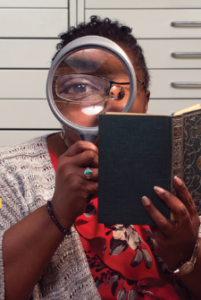Renee Harvey, librarian/archivist at the  Helmerich Center for American Research (HCAR) at Gilcrease, is a self-proclaimed bookworm.
Helmerich Center for American Research (HCAR) at Gilcrease, is a self-proclaimed bookworm.
“My love for books goes back to my first Little Golden Book,” said Harvey. “I remember holding the book in my hands and thinking it was the most magical thing ever and it was all mine. My love for museums is closely intertwined with my love for books. In my hometown, the main branch of the public library was on the first floor, while the second floor housed a museum. Once I checked out my books, I would go upstairs to look at the exhibits.”
As the person responsible for managing the Gilcrease Library and Archive, which houses the museum’s more than 100,000 rare books, documents, maps and unpublished works, Gilcrease is fortunate to have this “bookworm” on the team. As one may surmise, she is a walking wealth of information and passionate about a field most don’t know too much about — the inter-workings of a library and archive.
“The fundamental differences between an archive and a library is that libraries are collections of published books and other print or non-print materials organized for people to use, whereas archives house both published and unpublished materials in any format and have specific usage guidelines,” said Harvey. “Furthermore, archives often contain unique, specialized or one-of-a kind objects.”
At Gilcrease, Harvey gets to work in both. While her favorite aspect of the job is interacting with people one-on-one, she also recognizes the value of facilitating research for visiting Helmerich Center scholars.
“Archival materials are important because they are records of enduring value, much like a painting or a sculpture,” said Harvey. “The enduring value is in the ability of the records to speak to each generation allowing them to interpret with their knowledge.”
Last year, Harvey bolstered her qualifications by becoming a certified archivist through The Academy of Certified Archivists. As an independent, nonprofit certifying organization of professional archivists, members must meet set educational and experience requirements and pass the Archival Certification Examination.
“The archival certification process is a voluntary process,” said Harvey. “I have a master’s degree in library and information science from an American Library Association-accredited school, but I sought professional validation for the archival portion of my job. I also wanted to promote the profession of certified archivists.”
With more works than she could ever read, Harvey is right at home in the Gilcrease Library and Archive. If not for her passion and work preserving and archiving history, one of the country’s most extensive collections of rare books, documents and maps would not be available to share with the world. And while definitions of library and archive may be up for debate, there is no question that because of Harvey the dreams of Thomas Gilcrease are being realized every day at HCAR.